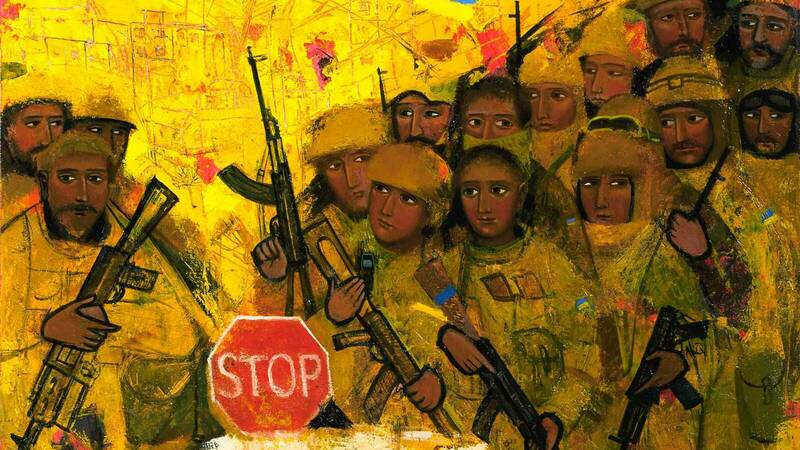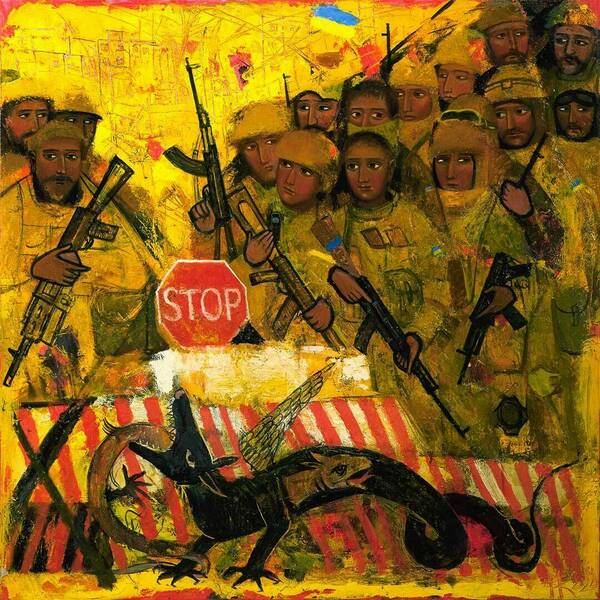
Guests
Mia Ramari
Analysis by Anna Gazewood

In April 2022, just two months after the full-scale Russian invasion of Ukraine, singer-songwriter Mia Ramari released her song “Гості” (“Guests”). In this indie hit, Ramari grapples with the invasion through a metaphor that frames the Russian army as unwelcome guests. Historically poetry and musical composition have been intertwined, from medieval troubadours to the setting of romantic poetry to music by composers such as Franz Schubert. Song lyrics must fit into certain metric constraints in order for their meaning to be conveyed and enhanced by musical tools. In combining music and poetry, singer-songwriters are able to raise their artistic voice in response to contemporary issues.
Since the beginning of the full-scale war, Ukrainian writers have used language and the written word to bear witness to their experiences of invasion. Music allows for an extra creative dimension in representing an experience or conveying a message. Indie singer-songwriters in particular, who produce and release music outside of a major label, are often allowed more artistic license. In an age where artists can promote new music through streaming and social media platforms, such as TikTok and YouTube, indie artists can have a wide reach. Independent Ukrainian singer-songwriters have gained popularity in releasing songs directly responding to the Russian invasion. In an interview, folk duo Tember Blanche describes their songs as important in fighting the Russian invasion on military, political, and cultural fronts by keeping the Ukrainian spirit alive. As Yuliia Sokolenko writes, Tember Blanche’s song “You’re Alive” utilizes repetition to build a feeling of hope for those who have sacrificed their lives for their country. In “Guests,” Ramari also uses repetition heightened by changes in musical intensity to build a poetic metaphor around the invaders themselves.
The song opens with Ramari singing “У мене вдома непрошені гості” (“I have uninvited guests at home”), an allusion to the Russian invasion. This is accompanied by a repetitive piano melody in an irregular meter. She continues the metaphor in the first verse by describing how she refuses to welcome these guests into her home. The ironic introduction of the Russian invaders as “guests” underscores the true nature of the invasion as an unwanted intrusion. Since the beginning of the invasion, the Russian government has flooded television with messages falsely depicting the war as a liberation campaign. While the invading soldiers may view themselves as welcome, the song exposes this fallacy by explaining that the host narrator never invited these self-proclaimed “liberators” in the first place. Not only are these guests unwelcome, but they are actively contributing harm to the place and people they are intruding upon. In the second line of the song, “Я їм замість хліба дам каміння і кості (Instead of bread, I’ll give them stones and bones),” Ramari invokes defensive anger against the Russian invaders. The mention of bread also calls upon the history of Soviet Russia forcibly starving the Ukrainian population in the Holodomor in response to Ukrainian resistance towards authoritarian policies. Ironically while invoking anger over the history of Russia burglarizing the Ukrainian people, Ramari sings a soothing melody. This contrast between lyrics and musical mood serves to elevate the simple almost childlike tone of the poem as an individual processes a monumental political and cultural crisis. The next stanza widens the scope of the metaphor of unwelcome guests beyond an individual home to a street that is threatened by violence from strangers. Ramari’s musical choices also help develop the metaphor as each sequential verse increases the depth of the texture with the addition of strings and percussion, which ramps up in the introduction of the first chorus.
The lyrics of the chorus introduce the theme of unity despite separation, as the narrator introduces a new character whom she refers to in the second person. Ramari juxtaposes the cold weapon held by the one they love fighting at the front with the heat of their own heart. The second part of the chorus repeats the line “And the two of us will be together, and I will be with you.” The use of the future tense implies the hope for a future where the couple is no longer separated. The first line of the verse following the chorus is “Separation unites me and my friends.” This paradoxical statement points to the idea of feeling unified by the common experience of separation and dislocation from friends, family, and lovers who are now scattered across the country and, sometimes, across borders. In this way, while the war has physically separated people amidst violence, it has also led to a sense of unity among the Ukrainian people facing invasion.
The lyrics of “Guests” deal with three subjects: “I,” “you,” and “them.” At the beginning of the song, “I” is the poetic voice or narrator, “you” is someone with whom the narrator shares a close relationship, and “they” are the guests or foreign enemies. However, the fourth verse of the song begins to change the nature of the relationship between “I” and “you” from one of allyship or friendship to one of division. Ramari sings:
“But you still began to scream untimely.
You laughed untimely, you fell silent untimely,
So now every one has already run away from you.”
Whereas before the narrator seems to share a closeness with the “you,” now she is speaking to an enemy that is separate from the narrator and her community. In contrast with the previous view of separation as a unifying force, this verse points to the negative aspects of the reality of separation caused by war. This recalls the second verse where Ramari remarks on the torment of “days without sunshine,” a line that is simultaneously a figurative reference to constant uncertainty and a literal evocation of the effects of air strikes and bombings on the physical environment in Ukraine. Before the final chorus, she sings: “No one has heard any ‘sorry’ or ‘please,’ - Regretfully, that’s your worst defeat.” Here, the “you” clearly references the Russian invaders or “unwanted guests.” Despite the initial expectations of a quick surrender, the Ukrainian people have not backed down and continue to fight the invasion.
Given that this song was released only a couple of months after the initial invasion, it is poignant that the message of the Ukrainian people rejecting Russian “guests” still rings true to the struggle today. While the narrator hopes for a unified future with their lover uninhibited by the presence of outside intruders, a change in tone evokes a sense of uncertainty and ambiguity during the invasion: everyday life is interrupted and a return to normalcy is hoped for but not guaranteed.
Research by: Anna Gazewood and Yuliia Sokolenko
Songwriter: Mia Ramari
Translator: Christian Scharlau
Theme: Invasion
Theme Introduction Next Exhibit
Header image: “Checkpoint” by Kateryna Kosianenko, oil on canvas, 2022. Image used with permission from Kateryna Kosianenko.